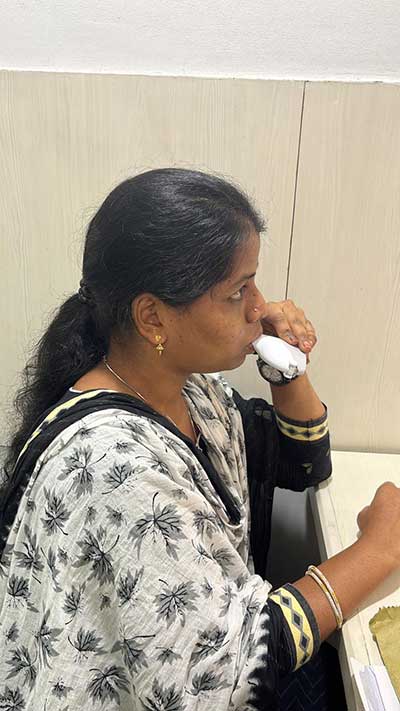All About Asthma
World Asthma Day – May 3rd
What is asthma?
Asthma is a chronic lung disease that causes inflammation of the airways. Its frequency among the Indian adult population is 2.4%.
What are the symptoms of bronchial asthma?

Wheeze, shortness of breath, chest tightness and cough are the symptoms of asthma. These symptoms vary over time and in intensity. Patients tend to have symptoms more at night or early in the morning and during winters. Symptoms can resolve spontaneously or in response to treatment. Patients can be symptom-free for many weeks or even months after which asthma can be triggered by factors such as exercise, allergen or irritant exposure like dust, fumes or even certain foods, change in weather or viral respiratory infections. Long-standing asthma can also lead to persistent symptoms.
Who gets asthma?
Asthma usually presents in children and young adults. However, it can occur in the elderly population as well, especially in smoking and obese individuals. Patients can have family history of asthma and allergic symptoms like running nose, nose block, headache and facial pain due to associated allergic rhinitis and sinusitis.
How to diagnose asthma?
Based on history, clinical examination and lung function testing using spirometry or PEF (peak expiratory flow meters).

Any role of routine eosinophil count testing?
Not routinely done at baseline. However, it can help in later stages to determine further treatment options other than inhalers in case of severe asthma.
What is not asthma?
Persistent cough with or without phlegm production, chest pain, palpitations, light-headedness, swelling of legs and lack of relief with inhalers or nebulisers.
What are the diseases which can mimic asthma?
COPD, bronchiectasis, airway tumours, foreign body in the airway and heart failure.
What are the associated conditions which can cause uncontrolled asthma symptoms?
Poor asthma control is associated with smoking, continued allergen exposure, occupational dust exposure, allergic rhinosinusitis, obesity, obstructive sleep apnea, gastric reflux, food allergy, pregnancy, incorrect inhaler technique, poor compliance to inhaler therapy, incorrect inhaler drugs and hospitalisation for asthma in the previous 12 months. Hence, it is necessary to address all these issues in an asthma patient to better control symptoms.

What are the treatment options?
Inhalers, in particular inhaled corticosteroids along with inhaled bronchodilators are the main stay of treatment. Dosing and frequency of the medications are determined by the treating doctor based on the severity of the illness. Regular follow-up is needed after initiation of treatment. Proper inhaler technique is a prerequisite for the effectiveness of the treatment and the same has to be verified during each clinic visit.
What are the types of inhaler devices available?
The three main devices available are metered-dose inhalers (MDI), dry powder inhalers (DPI) and nebulisers. The type of device used depends on patient preference and adequacy of usage technique as assessed by the treating physician.
Can asthma be self-managed?
Yes, possible. After a stable dose of inhaler therapy has been achieved for a patient and symptoms are well-controlled, a written asthma action plan can be given to the patient to self-monitor his symptoms and his lung function using PEF meter. Also, appropriate action to be taken is taught by the treating physician. However, if the symptoms continue to worsen, it is imperative that the patient seek immediate medical attention.
How to follow-up?
Initially, follow-up is necessary once every few weeks after treatment initiation and later, the frequency of visits can be reduced to once every few months depending upon symptom control.
Do asthma patients need life-long inhalers?
Yes, but the frequency of usage and dosage will be changed by the treating doctor depending upon the disease severity.
Any role of oral tablets or injections other than inhalers?
Yes, but only in the later stages of treatment when symptoms are not controlled with inhalers alone. Oral steroids are not advised at the outset in asthma as it has severe adverse effects.
Any role of allergen testing?
Not to be done routinely in all asthma patients. Patients are advised to avoid triggering factors for asthma symptoms. Allergen testing is done only in specialised settings to determine the need for immunotherapy in patients with persistent symptoms despite inhaler usage.
Do asthma patients tend to have severe COVID?
Well-controlled asthma doesn’t seem to have poor COVID outcomes compared to general population. However, poorly controlled asthma tends to have poor outcomes.
Is there any difference in asthma management between COVID and non-COVID patients?
No. However, use of inhalers are encouraged instead of nebuliser machines to minimise the spread of COVID to caretakers.
What are the vaccinations recommended for asthma patients?
Influenza and COVID-19 vaccinations are recommended with a gap of 14 days between them.
Role of yoga and breathing exercises?
Yes, these tend to improve the exercise capacity and quality of life.
Any role of bronchoscopy or surgery in asthma?
Bronchial thermoplasty is an interventional procedure wherein the airways are treated with radiofrequency probe to improve asthma symptoms and exercise capacity in those patients who have severe asthma.


